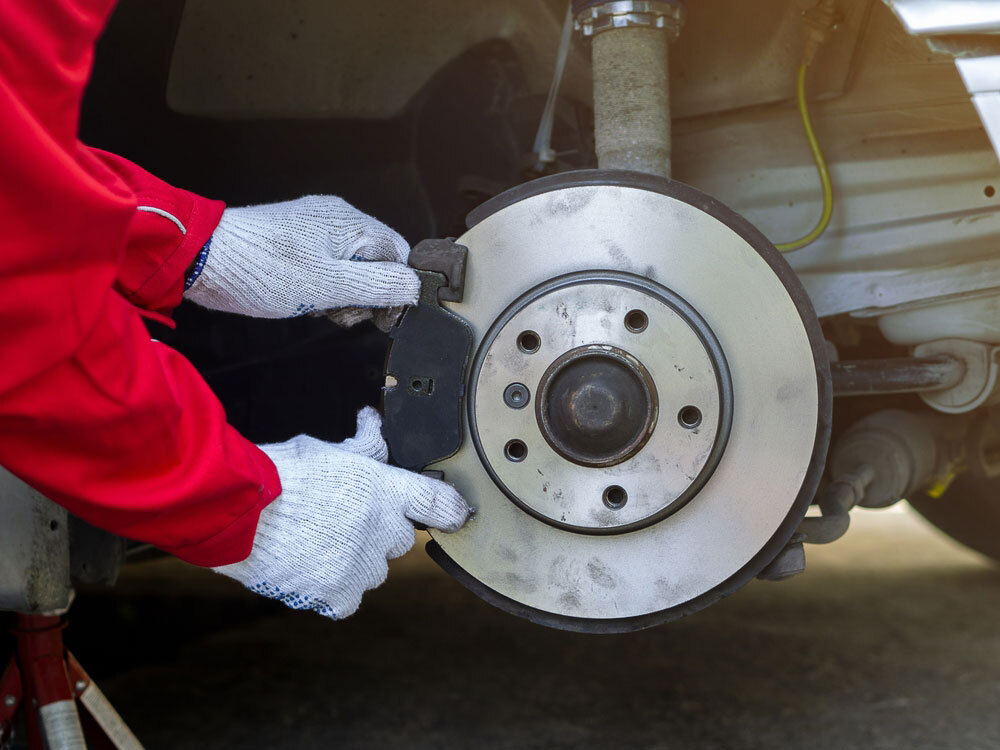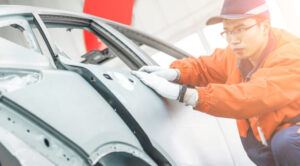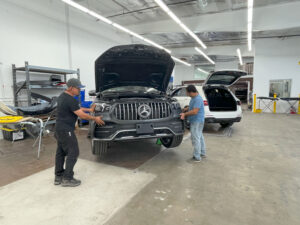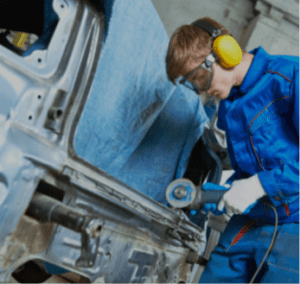Few things can be as disconcerting as the squeak of your brakes, especially when you’ve just replaced the brake pads and rotors. Brand new brakes squeaking is a common scenario that leaves many car owners wondering what is happening. In this guide, we’ll walk you through the reasons behind brakes still squeaking after replacing pads and rotors, how factors like rotor quality and brake pad installation play a role, and provide solutions to ensure a quieter ride.
Why Your New Brakes Squeak Initially?
Are your new brakes making noise when stopping? The squeaking sound when braking with new pads and rotors is not uncommon. In fact, it’s often a normal part of the initial bedding-in process. Brake manufacturers apply a layer of protective coating on the surface of brake pads to prevent corrosion during storage and transportation.
When you first install new pads and rotors, this coating needs to be worn off through use, and the surfaces of the pads and rotors need to mate properly for optimal performance. This initial period can result in squeaking, but it typically diminishes as the bedding-in process progresses.
The Impact from Brake Squeaking?
While initial squeaking is often considered normal, prolonged or persistent squeaking can indicate underlying issues. Understanding the various factors contributing to brake squeaking can help address the problem and ensure your new brakes function quietly and efficiently.
Rotor Surface and Quality: How They Affect The New Brakes Squeaking?
Smooth Rotor Surfaces: The quality and condition of the rotor surface play a crucial role in brake performance. If the rotor surface is not smooth or contains irregularities, it can lead to squeaking. High-quality rotors with a smooth finish contribute to a quieter braking experience.
Rotor Bedding-In: Just like brake pads, rotors also undergo a bedding-in process. During this period, a transfer layer is established on the rotor surface, enhancing the interaction with the brake pads. If the rotor surface is not adequately prepared during installation, it can result in uneven pad contact and squeaking.
Brake Pad Installation: Common Mistakes that Lead to New Brake Squeaking
Pad Positioning: Incorrect positioning of brake pads can lead to uneven wear and noise. Proper alignment and placement are crucial for consistent contact between the brake pads and rotors.
Missing Shims or Insulators: Brake pad shims and insulators play a role in dampening vibrations and reducing noise. Missing or improperly installed shims can contribute to brake squeaking.
Cleanliness During Installation: Contaminants or debris introduced during brake pad installation can affect the mating surfaces and lead to noise. Thoroughly cleaning all components before installation is essential.
Lubrication Issues and Brake Performance
Caliper Slide Pins: The caliper slide pins facilitate the movement of the caliper and pads. Inadequate lubrication of these pins can result in uneven pad wear and noise during braking.
Backing Plate Contact Points: Lubricating the backing plate contact points where the brake pad tabs make contact can reduce friction and noise. Failure to lubricate these points can contribute to squeaking.
Anti-Squeal Compound: Applying an anti-squeal compound or brake grease on the back of the brake pads can help dampen vibrations and reduce noise. Ensure proper application during installation.
Brake Dust and Contaminants: How They Contribute to Brake Squeaking
Brake Dust Accumulation: Brake dust, composed of pad material and debris, can accumulate on the rotor and pad surfaces, leading to noise. Regular cleaning of the brake components can mitigate this issue.
Contaminated Brake Pads: Contaminated brake pads, such as those exposed to oil or grease, can contribute to squeaking. Ensuring a clean and oil-free environment during installation is crucial.
Temperature and Humidity: Environmental Factors and Brake Noise After New Pads
High Humidity: In humid conditions, moisture can affect the brake pad and rotor surfaces, leading to noise. While this is often temporary, ensuring proper drying of components during installation can help.
Cold Weather Conditions: In colder temperatures, brakes may produce more noise. The use of high-quality brake pads designed for diverse temperature ranges can help mitigate this issue.
Less Common Factors for Brake Squeaking After Replacement
Pad Material Composition: Some brake pad materials are more prone to noise than others. Ceramic brake pads, for example, tend to produce less noise compared to semi-metallic pads. Consider the type of pads installed.
Incompatibility Between Pads and Rotors: Using pads and rotors from different manufacturers may result in compatibility issues and noise. Opt for a complete brake kit from a reputable source for consistent performance.
Resonance and Harmonics: Certain vehicle models may be more susceptible to resonances and harmonics that amplify brake noise. Identifying and addressing these factors may require expert assistance.
Resolving Brand New Brakes Squeaking: Tips and Solutions for a Quieter Ride
- Allow for Proper Bedding-In:
Allow the brakes to undergo the bedding-in process as recommended by the manufacturer. This involves a series of gentle stops to establish the proper transfer layer on the rotor surface.
- Verify Proper Installation:
Double-check the installation of brake pads, rotors, and all associated components. Ensure correct alignment, proper lubrication, and the use of shims or insulators as needed.
- Address Rotor Quality:
Invest in high-quality rotors with a smooth surface finish. If your rotors exhibit signs of uneven wear or damage, consider replacement.
- Lubricate Caliper Slide Pins:
Apply the appropriate lubricant to caliper slide pins to ensure smooth movement. This can reduce friction and prevent uneven pad wear.
- Clean Brake Components:
Regularly clean brake components, including the rotor and pad surfaces, to remove brake dust and contaminants. Use a brake cleaner or an appropriate solvent.
- Check for Proper Pad Material:
Consider the type of brake pads installed. Ceramic brake pads are known for producing less noise compared to semi-metallic pads.
- Address Environmental Factors:
Be mindful of environmental conditions such as humidity and temperature. Take precautions during installation to ensure components are dry and free from contaminants.
- Consult with Professionals:
If the squeaking persists or if you’re uncertain about the cause, consult with a professional mechanic. They can perform a thorough inspection and identify any underlying issues.
If Your New Car Brakes Squeak
While new brakes squeaking can be a common occurrence during the initial bedding-in process, persistent or excessive noise demands attention. Regular inspections, attention to detail during installation, and addressing issues promptly can ensure your fresh brakes provide optimal performance without the unwanted soundtrack. If in doubt, seeking professional auto repair assistance is always a wise choice to diagnose and resolve any brake-related concerns.
If you ever need auto body or collision repair in the future, be sure to contact us or fill out our mobile estimate form.




